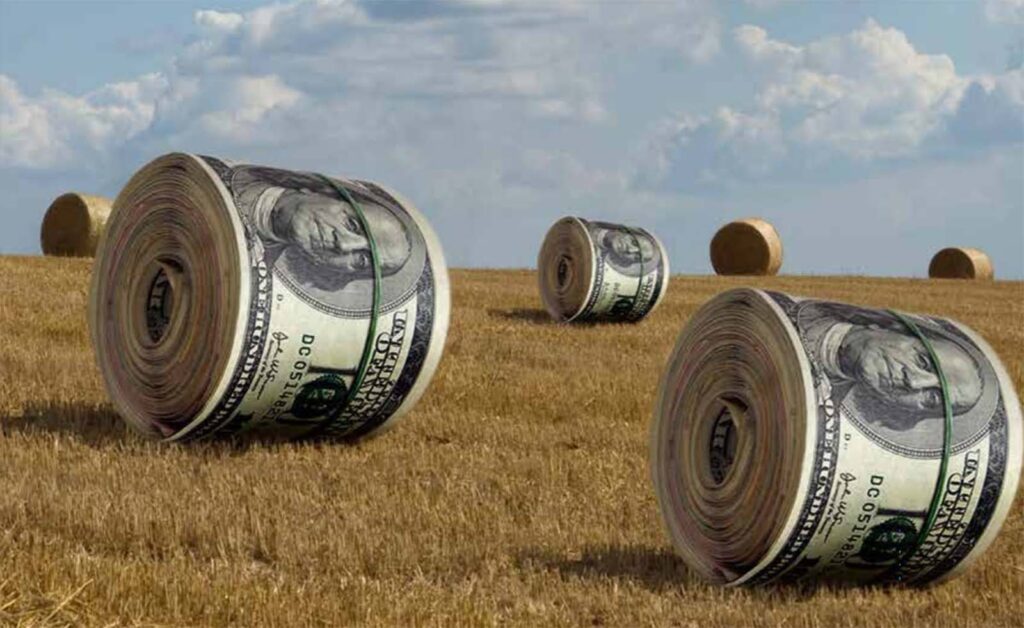They don’t sell seeds. They don’t own tractors. They don’t run warehouses or ship grain. But BlackRock, Vanguard and State Street are among the most powerful actors in global agriculture.
Together, these three asset managers control more than $26 trillion in assets—more than the GDP of the United States and India combined. They are shareholders in nearly every major agribusiness: Bayer, Cargill, ADM, Nestlé, Deere & Co and more. They don’t compete. They co-own. And through that ownership, they govern.
This is not capitalism as competition. It’s capitalism as quiet coordination.
These firms don’t need to dictate policy. They shape the terrain on which policy is made. Their influence is structural, not spectacular. It’s exercised through boardrooms, shareholder resolutions and capital flows. And it’s largely invisible to the public.
But its effects are everywhere.
According to the Food Barons 2022 report by ETC Group, BlackRock, Vanguard and State Street hold dominant stakes across the agrifood chain—from seeds and chemicals to supermarkets and logistics platforms. In many sectors, they are the top three shareholders in all the major firms. This means that ‘competition’ between companies like Bayer and Syngenta, or Nestlé and PepsiCo, is often little more than a performance. The real power sits behind the curtain.
These firms don’t micromanage. They don’t need to. Their power lies in alignment—in shaping what counts as value, what counts as risk and what counts as acceptable behaviour. And increasingly, that behaviour is being framed through the lens of ESG: Environmental, Social and Governance metrics.
But ESG is not a moral compass. It’s a risk framework.
In recent years, BlackRock and its peers have positioned themselves as climate-conscious investors. They speak of ‘net zero’, ‘transition finance’, and ‘sustainable agriculture’. But this is not about decarbonising the food system. It’s about de-risking portfolios.
The same firms that invest in fossil fuels also invest in carbon offset schemes. The same firms that back industrial agriculture also fund ‘climate-smart’ seed technologies. It’s a hedging strategy, not a transformation.
And in India, this logic is taking root.
Asset managers are increasingly backing land-leasing platforms, agrifintech startups and carbon credit aggregators that promise to ‘unlock value’ from farmland. But unlocking value often means locking farmers into new forms of dependency—on scoring systems, digital compliance and speculative markets they don’t control.
This is not investment. It’s extraction with a sustainability label.
The most dangerous shift in agriculture today is not technological—it’s financial. Land is no longer just a place to grow food. It’s an asset class. A hedge against inflation. A site for data capture and carbon speculation.
In this model, the farmer is not a producer. They are a tenant on someone else’s spreadsheet.
And the spreadsheet is global.
BlackRock doesn’t need to own the land. It just needs to own the firm that owns the firm that leases the land. Through layers of investment vehicles, farmland is being bundled, securitised and traded—often without the knowledge of those who live on it.
This is enclosure without fences. Governance without government.
Asset managers like to present themselves as passive investors. They claim they don’t direct company strategy—they just follow the market. But when you own 5–10 per cent of every major firm in a sector, you are the market.
And when you vote on shareholder resolutions, appoint board members and shape executive pay, you are not passive.
In 2023, BlackRock and Vanguard voted against resolutions that would have required agribusinesses to disclose their impacts on deforestation and land rights. Their justification? The proposals were “too prescriptive”. But what they were really protecting was the freedom to operate without scrutiny.
What makes BlackRock, Vanguard and State Street so dangerous is not that they are evil. It’s that they are structural. They don’t need to conspire. Their incentives are aligned. Their tools are abstract. And their power is exercised through absence—of regulation, of transparency, of accountability.
They are not the villains of this story. They are the architecture.
And that makes them harder to fight.
Food sovereignty is not just about seeds or soil. It’s about power. And power today is financial. It flows through indexes, benchmarks and capital allocations. It decides which crops are grown, which firms survive, and which futures are funded.
And it does so without ever touching the soil.
The above article is taken from Colin Todhunter’s new open-access book Digital Harvest: Unmasking the Corporate Enclosure of Food, which can be read or downloaded via Figshare.
Read the full article here
